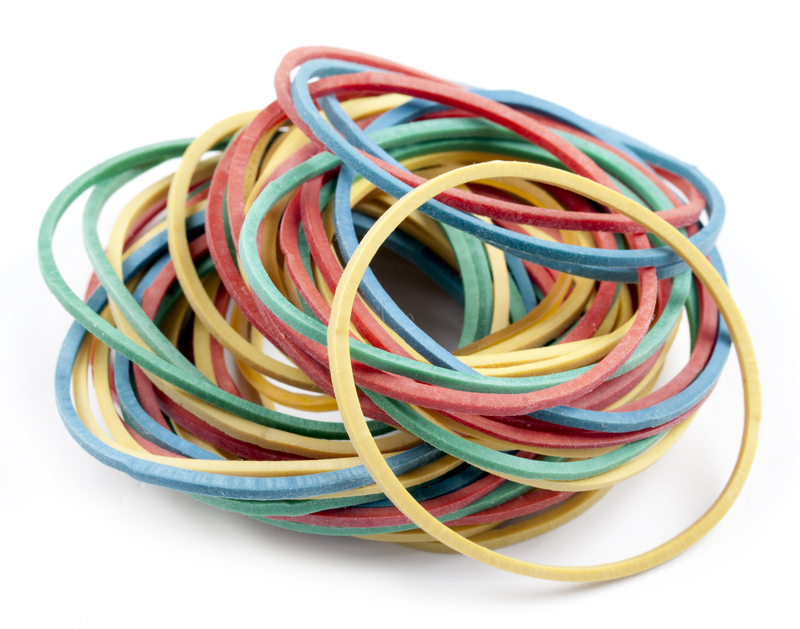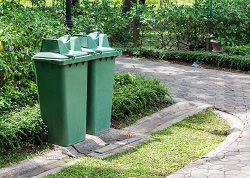Recycle Pots and Pans: Turn Kitchen Waste into Resources
Posted on 01/07/2025
Recycle Pots and Pans: Turn Kitchen Waste into Resources
In our daily quest for sustainability, we are often told to recycle paper, plastics, and glass, but what about the items lurking in our kitchens? When it's time to part with your old frying pan or retire that dented saucepan, your first instinct might be to toss it in the trash. However, recycling pots and pans is not only possible, but it's also crucial for minimizing waste and conserving resources. In this comprehensive article, we'll unlock the secrets of how to recycle cookware, explain its environmental impact, and offer practical tips to transform kitchen castoffs into valuable materials.

Why Recycle Old Pots and Pans?
It's easy to overlook old cookware when considering what to recycle, yet millions of pots and pans are discarded every year. This habit contributes to overflowing landfills, unnecessary waste of metals, and squandered energy. In reality, recycling kitchenware is an essential step that brings several benefits:
- Reduces landfill waste: Metals and non-stick coatings can persist in the environment for decades.
- Saves natural resources: Most cookware contains valuable aluminum, stainless steel, iron, or copper--all of which can be reused.
- Conserves energy: Recycling existing metals uses less energy than extracting and processing new materials.
- Mitigates pollution: Proper recycling prevents potentially harmful substances from leaching into the soil and water.
Did You Know?
If every household in the U.S. recycled just one aluminum pan a year, it would save enough energy to light thousands of homes. That's the power of transforming kitchen waste into resources!
Types of Pots and Pans Suitable for Recycling
Whether you have ancient cast iron, battered nonstick skillets, or rusty baking sheets, recycling cookware options exist. Here's how to identify what you can recycle:
- Aluminum pots and pans: Lightweight and resistant to rust; can be melted down and reused.
- Stainless steel cookware: Commonly accepted at metal recycling centers; highly valuable for its durability.
- Copper cookware: Sought-after by scrap metal dealers for its value.
- Cast iron pans: Incredibly durable and fully recyclable, though often reusable or restorable.
- Non-stick (Teflon-coated) pans: May require special handling due to cookware coatings.
How to Prepare Old Cookware for Recycling
Before recycling, follow these steps to maximize resource recovery and ensure safe handling:
- Clean thoroughly: Remove all food residue and grease. A quick scrub ensures better processing.
- Separate materials: Detach any plastic, rubber, or wood handles if possible, as these are often recycled differently.
- Check for non-stick coatings: Some facilities require the coating to be removed. Contact your recycling provider for their guidelines.
- Group by metal type: If possible, sort your pans by metal to simplify recycling.
Tip: If you're unsure about your cookware's material, use a magnet. If it sticks, it's likely steel or iron; if not, it's probably aluminum or copper.
Where Can You Recycle Pots and Pans?
You might be wondering: How and where do I recycle old cookware? Here's a breakdown of your recycling options for kitchenware:
1. Local Recycling Centers and Scrap Yards
Most municipal metal recycling centers accept pots and pans, but you should always verify their requirements. Scrap metal yards, in particular, are interested in aluminum, copper, iron, and steel items. Be sure to remove non-metal parts before dropping off your items.
2. Specialized Recycling Programs
Some kitchenware recycling programs are run by retailers or environmental organizations. For example:
- Retailer take-back programs: Some stores like Target and Bed Bath & Beyond periodically offer cookware recycling services--check with your local branch.
- Manufacturer mail-back: A few brands will accept their old products for responsible recycling.
3. Curbside Collection (With Caution)
A handful of municipal areas include cookware with curbside recycling, but it's essential to confirm first. Some facilities do not process cookware due to size, shape, or coatings. Never assume it is accepted curbside--verify in advance!
4. Donation and Reuse
If your pans are still in usable condition, consider:
- Donating to local charities, shelters, or food banks.
- Giving them a second life through online marketplaces or freecycle groups.
- Offering them to friends, families, or community kitchens in need.
Recycling Non-Stick and Teflon-Coated Cookware
Non-stick pans, especially those with Teflon or ceramic coatings, pose unique challenges. These coatings can't be processed with standard scrap metal and may require special handling. Here's how to handle your coated cookware recycling:
- Check with local scrap yards: Some facilities have processes for removing the coating and recycling the base metal.
- Separate the coating if possible: If detachable, remove the coating to leave bare metal. This isn't always practical for home recyclers.
- Contact manufacturers: Some brands offer mail-back recycling specifically for their non-stick products.
- Consider creative reuse: If recycling isn't available, consider repurposing these pans (see "Upcycling Cookware" below).
Upcycling: Creative Ways to Reuse Old Pots and Pans
Sometimes recycling isn't possible--especially for multi-material or heavily coated cookware. Upcycling offers a smart, fun, and eco-friendly way to keep cookware out of landfills. Try these creative projects:
- Planter pots: An old saucepan or colander makes a quirky yet functional garden planter.
- Wall art: Vintage pans can become unique decorations or kitchen wall organizers.
- Bird feeders or baths: Give wildlife a treat with a upcycled iron pan birdbath or feeder.
- Storage containers: Use deep pots to organize garden tools, craft supplies, or office gear.
- Chandeliers and light fixtures: Creative DIYers have made stunning light fixtures out of old colanders, steamers, and baking gear.
Did You Try This?
Tag your upcycling creations on social media with #RecyclePotsAndPans to inspire others to turn trash into treasure!
Environmental & Economic Benefits of Recycling Cookware
Recycling old pots and pans isn't just good for your home--it's vital for the planet. Here are the far-reaching benefits of transforming kitchen waste into reusable resources:
1. Conservation of Raw Materials
Mining new metals is energy-intensive and destroys habitats. Recycling cookware decreases demand for new mining, preserving Earth's resources for future generations.
2. Energy and Emissions Savings
Producing aluminum from recycled materials saves up to 95% of the energy compared to creating it from raw ore. Every recycled pot or pan helps lower greenhouse gas emissions.
3. Economic Growth and Jobs
The recycling industry creates thousands of local jobs, from collection and processing to product sales. It also supports the circular economy, keeping valuable resources in use.
4. Cleaner Communities
When fewer kitchen items end up in landfills, our local environments are healthier, cleaner, and more beautiful. Reduced waste means safer neighborhoods and a better quality of life.
Common Questions About Recycling Pots and Pans
Can I put pots and pans in regular recycling bins?
Usually, no. Cart-style curbside pickups are designed for standard recyclables (like bottles and cans), not bulky items. Pots and pans can damage sorting machinery. Always check with your local recycling center for specific guidance.
What about rusted or damaged cookware?
Rusty or broken pots and pans are still recyclable, especially if they are metal. Just be sure they are clean and as free from non-metal parts as possible.
Is it worth it to recycle just a few pans?
Absolutely! Every piece of recycled metal makes a difference in energy savings and reduces the mining burden.
Can ceramic or glass cookware be recycled?
No, ceramic and glass cookware cannot be processed with metal recycling streams. Check with local facilities for special options or consider upcycling at home.
What are some signs that pots and pans are beyond repair?
- Loose, permanently separated handles and hardware.
- Cracked or warped bodies, especially in non-stick pans.
- Difficult-to-clean, deeply scratched or pitted non-stick surfaces.
- Irremovable rust or corrosion that affects pan integrity.
At this stage, recycling or upcycling is better than sending them to the dump.
Best Practices for Buying Recyclable Cookware
Ensure a greener future by choosing sustainable and recyclable cookware from the start:
- Pick simple materials: Stainless steel, cast iron, copper, and aluminum are all highly recyclable.
- Avoid excessive coatings: Multi-layered or ceramic-coated pans are harder to recycle.
- Look for modular construction: Pans with removable handles are easer to sort and process.
Supporting brands committed to recyclable cookware helps drive the industry toward better design and more sustainable options.

Take Action: Start Recycling Your Old Pots and Pans Today
Recycling pots and pans is a simple action with a profound impact. By responsibly disposing of your unwanted cookware, you're steering kitchen waste away from landfills and into new, useful products. Whether you drop off your unwanted pans at a metal recycler, find a retailer take-back program, or get creative with upcycling projects, you're joining the circular economy movement and helping the planet.
So, the next time your skillet doesn't sizzle or your saucepan sees its last soup, don't toss it in the trash. Instead, recycle your pots and pans and champion a greener kitchen for all.
Key Takeaways: Recycle Kitchenware to Turn Waste Into Resources
- Most cookware is recyclable: Aluminum, stainless steel, copper, and cast iron can usually be recycled with scrap metals.
- Check with local centers: Not all recyclers accept cookware, especially non-stick varieties.
- Prepare items properly: Clean and separate materials for best results.
- Explore creative reuse: Upcycle old pans as planters, decor, or storage containers.
- Reduce, reuse, recycle: Choose sustainable cookware and recycle your old pans to support a cleaner environment.
Ready to make a difference? Recycle your pots and pans, and help turn kitchen waste into valuable new resources!

 020 3859 5580
020 3859 5580 020 3859 5580
020 3859 5580





 House Clearance
House Clearance Rubbish Collection
Rubbish Collection House clearance in London has never been easier, as Junk Removal Services can take care of your every need. From individual house junk...
House clearance in London has never been easier, as Junk Removal Services can take care of your every need. From individual house junk... With Junk Removal Services you can be confident that you’ll receive the most professional and affordable rubbish collection service within the London...
With Junk Removal Services you can be confident that you’ll receive the most professional and affordable rubbish collection service within the London...




